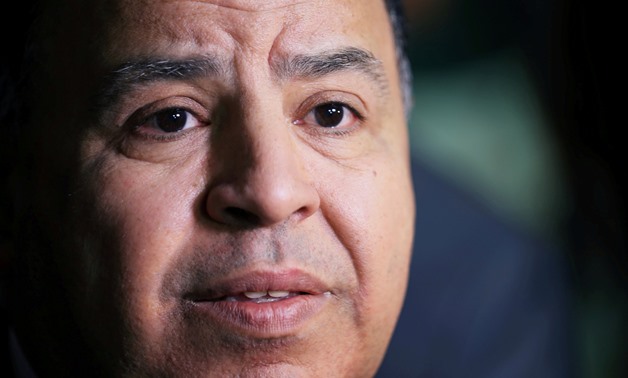
FILE PHOTO: Finance Minister Mohamed Maait speaks during a news conference in Cairo, Egypt July 5, 2018. REUTERS/Mohamed Abd El Ghany/File Photo
CAIRO – 21 December 2020: Egypt will establish an electronic system to track the goods received under the indirect transit system until the final release stage, and to deal in customs with goods contracted with the modern e-commerce system, with the possibility of pre-clearance and payment of customs duties before the goods arrive, Minister of Finance Mohamed Maait said Monday.
Maait added that the system will also allow the exchange of information and secured data electronically between the Customs Authority and the state's agencies or external parties with which agreements have been concluded that acknowledge this, and the introduction of a comprehensive risk management system.
He explained in a statement that this leads to the release of the goods without detection or inspection via the green path, in accordance with the established controls, in order to simplify procedures and speed up customs release.
The minister pointed to the establishment of an electronic system for advance information on goods before they are shipped from the export port to the Egyptian ports, which is scheduled to be launched experimentally next April, and mandatory next July, as we aim to establish a proactive method of performance instead of the traditional "reaction" policy.
The minister emphasized that the year 2020 witnessed an unprecedented legislative boom with the issuance of the new customs law, which was praised by the International Monetary Fund, with its international practices that contribute to strengthening international trade.
He mentioned that the new law includes new facilities for those dealing with customs, including: the introduction of a new system for settling customs disputes, which allows grievances to the administration before resorting to arbitration, in a way that prevents the exacerbation of disputes between the owners of goods and the customs authority, and establishes consensual solutions to many problems through a joint committee that includes both dispute parties.
He pointed to the introduction of a temporary customs warehouse system so that ports are transit gates for goods, and are not places for their storage or accumulation, in a way that contributes to legalizing the status of the yards and stores that originate inside the ports, and through which customs services are provided on imported and exported goods.
Maait added that the new law aims to encourage national industry, reduce the cost of local production and maximize its competitiveness in the global markets, as it includes the advantage of installment customs tax due on machinery, equipment, devices, production lines and their requirements that do not enjoy any exemptions or reductions in customs tariffs when they are working in the field of production, in exchange for Paying an additional tax calculated as a percentage of the value of the unpaid customs tax for each month or part of it.
He explained that the new law includes exempting customs duties for government and university hospitals, equipment, medical supplies, medicines, blood products, serums, family planning methods and baby milk. In fulfillment of the constitutional obligations to provide health care to citizens.
He emphasized that the legal framework for the free-market system had been developed, as it was not previously regulated by the previous law, as they were treated like private warehouses even though they are not warehouses in the strict sense, but rather places where goods are licensed to display and sell other than customs taxes.
He said that the new law included the principle of non-prejudice to the exemptions established by other laws in effect to prevent duplication, such as the Sports Law, the Rights of Persons with Disabilities Law, and other laws that establish customs exemptions.
Comments
Leave a Comment